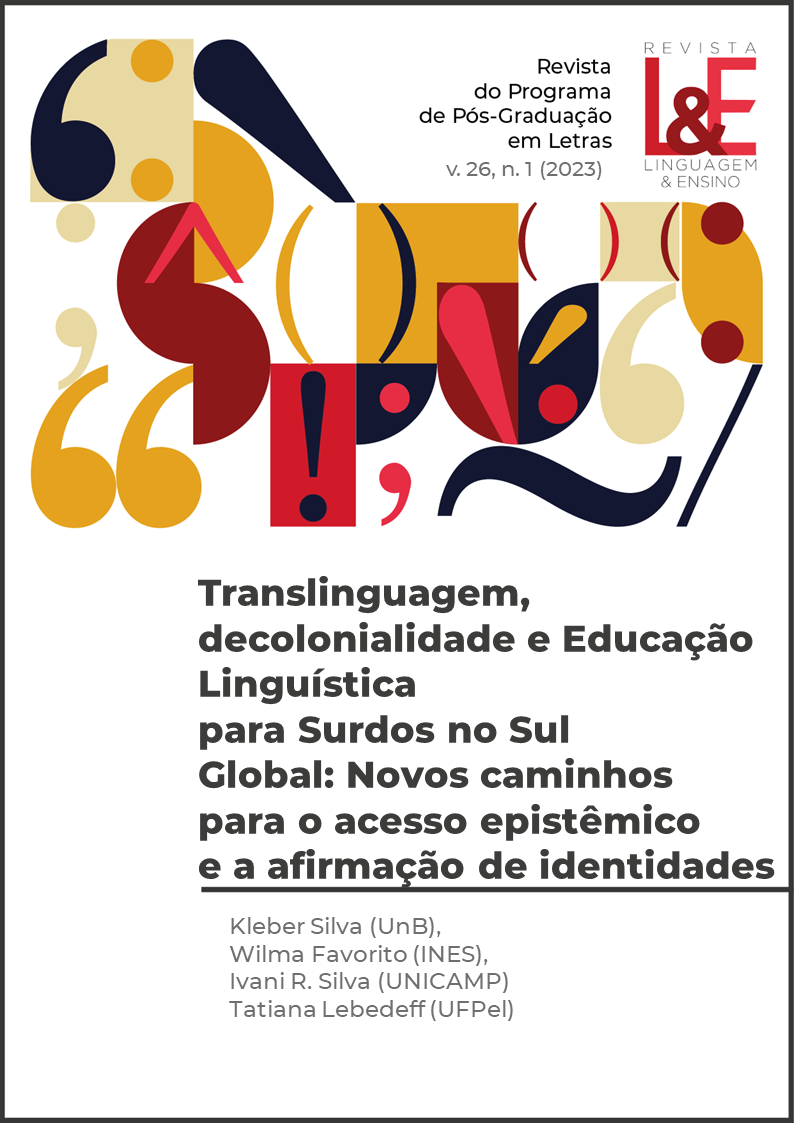Translinguagem, decolonialidade e educação linguística para surdos no sul global
novos caminhos para o acesso epistêmico e a afirmação de identidades
Resumo
Visando a contribuir com a educação linguística para surdos no Sul Global, a partir de posturas críticas e/ou decoloniais (ANZALDÚA, 1987; QUIJANO, 2005; SANTOS, 2015; SOUSASANTOS, 2019), a intencionalidade do presente dossiê foi inspirada em estudos e pesquisas realizadas sob o prisma da Linguística Aplicada Crítica (PENNYCOOK; MAKONI, 2019; PENNYCOOK, 2018 2001; MENEZES DE SOUZA, 2019; KUMARAVADIVELU, 2012; MAKONI; PENNYCOOK, 2006; MOITA LOPES, 2006; RAJAGOPALAN, 2003), além de outras abordagens teóricas. O objetivo foi problematizar e analisar a crença na concepção de linguagem como uma entidade estática para enfatizar a mobilidade e fluidez entre as línguas, a mescla de identidades e culturas sem o cerco das fronteiras. O comportamento de falantes multilíngues mostra um uso móvel, ilimitado e versátil de mais de uma língua ao mesmo tempo para dar sentido ao mundo ao seu redor.
Referências
CANAGARAJAH, S. Translingual Practice as Spatial Repertoires: Expanding the Paradigm beyond Structuralist Orientations. Applied Linguistics, v. 39, n. 1, p. 1-25, 2017a.
CANAGARAJAH, S. Translingual Practice: Global Englishes and Cosmopolitan Relations. London/New York: Routledge, 2013.
CANAGARAJAH, S. Translingual practices and neoliberal policies: attitudes and strategies of African skilled migrants in Anglophone workplaces. New York: Springer, 2017b.
COELHO, O. Surdos estudam e investigam na Universidade do Porto: contributos para a reflexão sobre a universidade inclusiva no âmbito da surdez. In: LOPES, A.; FREITAS, A.; PIZZI, L.; CAVALCANTE, M.; FREITAS, M.; NEIZA, F. (Orgs.). Formação docente em contextos de mudanças. Maceió: Edufal, 2012. p. 195-226.
COLLINS, P. H. Se perdeu na tradução? Feminismo negro, interseccionalidade e política emancipatória. Revista Parágrafo, v. 5, n. 1, p. 6-17, 2017.
FAVORITO, V.; SILVA, I. R. Políticas linguísticas e educação de surdos. In: SILVA, K. A.; RAJAGOPALAN, K. (Orgs.). Políticas Linguísticas no Brasil: rumos, contornos, perspectivas e meandros. São Paulo: Pá de Palavra/Parábola Editorial, 2023 (no prelo).
GARCÍA, O. Bilingual education in the 21st century: A global perspective. Oxford: WileyBlackwell, 2009.
HOFFMAN, D.; WOLSEY, J.; ANDREWS, J.; CLARK, D. Translanguaging supports reading with deaf adult bilinguals: a qualitative approach. The Qualitative Report, v. 22, n. 7, p. 1925-1944, 2017. IPHAN. Instituto do Patrimônio Histórico e Artístico Nacional. Literatura de Cordel: Dossiê de Registro. Brasília, 2018.
KUMARAVADIVELU, B. Individual identity, cultural globalization, and teaching English as an international language: the case for an epistemic break. In: ALSAGOFF, L. et al. (Eds.). Principles and practices for teaching English as an international language. New York: Routledge Taylor & Francis Group, 2012. p. 9-27.
MAKALELA, L. Not Eleven Languages: Translanguaging and South African Multilingualism in Concert. New York: Mouton De Gruyte, 2021.
MAKALELA, L.; WHITE, G. (Eds). Rethinking Language Use in Digital Africa: Technology and Communication in Sub-Saharan Africa. Clevedon: Multilingual Matters, 2021.
MAKONI, S.; PENNYCOOK, A. Disinventing and reconstituting languages. Clevedon: Buffalo, 2006.
MENEZES DE SOUZA, L. M. Glocal languages, coloniality and globalization from below. In: GUILHERME, M.; MENEZES DE SOUZA, L. M. (Eds.). Glocal languages and critical intercultural awareness: The south answers back. New York: Routledge, 2019. p. 17-41.
MOITA LOPES, L. P. (Org.). Por uma linguística aplicada indisciplinar. São Paulo: Parábola Editorial, 2006.
NDLOVU, F.; MAKALELA, L. Decolonising multilingualism in Africa: Recentering Silent Voices from the Global South. Clevedon: Multilingual Matters, 2021.
PENNYCOOK, A. Critical applied linguistics: a critical introduction. New Jersey: Lawrence Erlbaum Associates, 2001.
PENNYCOOK, A. Posthumanist Applied Linguistics. London: Routledge, 2018.
PENNYCOOK, A.; MAKONI, S. Innovations and Challenges in Applied Linguistics from the Global South. London: Routledge, 2019.
QUIJANO, A. Colonialidade do poder, Eurocentrismo e América Latina. In: LANDER, E. (Org.). A colonialidade do saber: eurocentrismo e ciências sociais. Perspectivas latino-americanas. Buenos Aires: CLACSO, 2005. p. 117-142.
RAJAGOPALAN, K. Por uma linguística crítica: linguagem, identidade e questão ética. São Paulo: Parábola Editorial, 2003.
RIBEIRO, A. C. Literatura de cordel contemporânea: Uma tradução prazerosa do par linguístico Português-Libras. 2020. 187 f. Dissertação (Mestrado em Estudos da Tradução) – Programa de Pós-Graduação em Estudos da Tradução da Universidade Federal de Santa Catarina, Universidade Federal de Santa Catarina, Florianópolis, 2020.
ROCHA, C. H.; TANZI NETO, A. Translinguagens: discurso, políticas e pedagogias. Revista X, v. 15, n. 1, p. 01-06, p. 1-6, 2020.
SANTOS, M. Por uma outra globalização: do pensamento único à consciência universal. Rio de Janeiro: Editora Record, 2015.
SILVA, K. A.; MAKALELA, L. (Eds.). Routledge Handbook of Translanguaging in the Global South. Routledge: London, 2023.




1.png)
